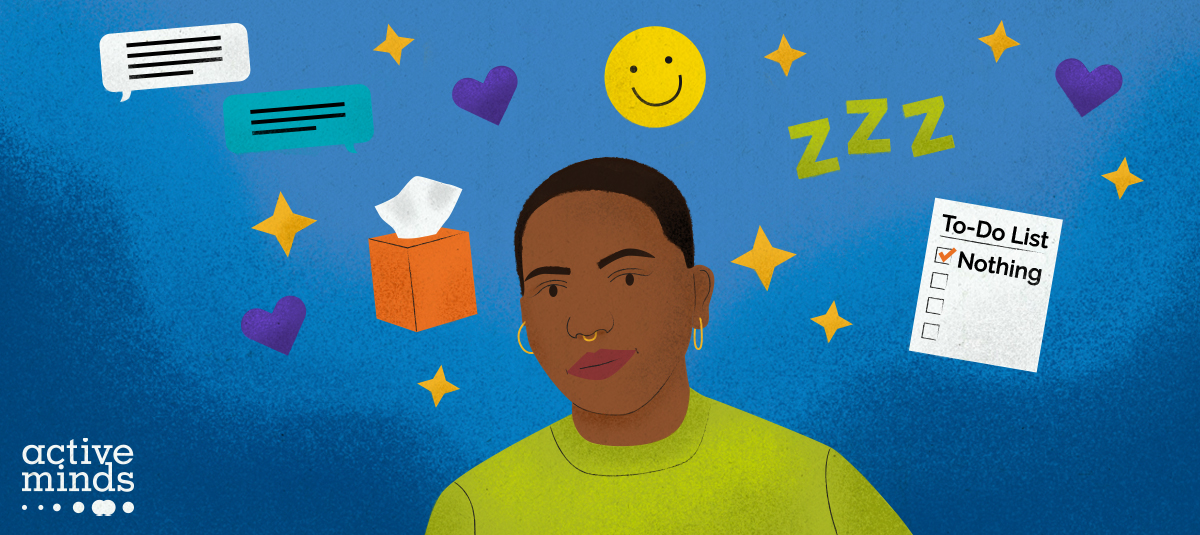A peek online will expose you to a seemingly unlimited number of self-care routines, tips, and advice. But take a second look, and you’ll see a disconnection between what internet influencers portray as self-care and what a self-care day actually looks like. What does it mean to care for yourself?
Is it popping a different color bath bomb in your tub every night?
Is it religiously meal-prepping your every bite?
Does it look like 12 step skincare routine?
The National Institute of Mental Health defines self-care as “taking the time to do things that help you live well and improve both your physical and mental health.” It is an integral part of any person’s mental health and self-esteem. But spend any time with the online discourse surrounding self-love, and you’ll think that unless you have that $20 moleskin journal, you’ll never be able to pursue a journaling practice properly. There is an underlying and often unspoken relationship between consumerism and the self-care community. We need to acknowledge this so that we can treat this aspect of our mental health with the authenticity it deserves.
Consumerism places a price tag on our mental well-being. It tells us that without a particular product or service, we won’t be able to achieve happiness. It hides the reality of self-care in pretty clothes and makeup, leaving us to compare our lives to the images we see online. Self-care begins and ends with the self; that is all you need to start your practice. Here are some simple ways to incorporate self-care that are not always pretty and don’t always appear at the top of the list but are just as important.
- Doing absolutely nothing at all.
In our current hustle culture, we feel this immense pressure to be everywhere doing everything at once just to keep up. The never-ending to-do list can make it hard to take time for yourself and do what your body needs. After a long day, even self-care practices like cleaning, cooking, or exercising can seem like another chore. Sometimes it can help to sit back and do nothing. No plans, no distractions, no expectations. Just you and a clear schedule. Use this time to rest and do what feels good for you.
- Crying.
We often try to shield ourselves from negative emotions. Self-care is depicted as something positive and bright, but ugly and unpleasant feelings also have a lot to teach us about ourselves. True self-love means accepting the good with the bad. This may look like sitting with your negative emotions instead of trying to run away or dissociate. Crying is a great way to release pent-up stress. It also forces you to be present with your feelings rather than turning them off. So next time you need it, grab some Kleenex and release it! Give yourself a break and try not to judge yourself for feeling bad or off. - Do that thing you’ve been putting off.
Our ability to love ourselves is deeply tied to our respect and trust in ourselves and our capabilities. When we put things off, procrastinate, or don’t meet our goals, we damage this trust making it harder to have faith in ourselves.This lack of faith can reinforce the negative and limiting beliefs that tell us we are not capable enough. The only way to counter these thoughts is through action. Start small and make a consistent effort. Track your progress to keep yourself motivated and see how far you can go. - Talk to others.
Self-love is not cultivated in a vacuum. Our relationship with ourselves is often shaped by our relationship with others, especially in our childhood. As we grow up and become more isolated, it can be hard to relearn these negative patterns without the help of others. Seeking support from your community is a great way to practice giving and receiving love healthily.
Hopefully, some of these tips reframe how you look at self-care. It doesn’t have to be flashy and complicated. Everyone’s practice is different, and self-care can be something as simple as taking a nap. You have the power to determine what matters the most to you in your own journey toward self-care and acceptance. So as you navigate these online spaces, don’t forget that it’s okay to make mistakes; no one is perfect all the time.




